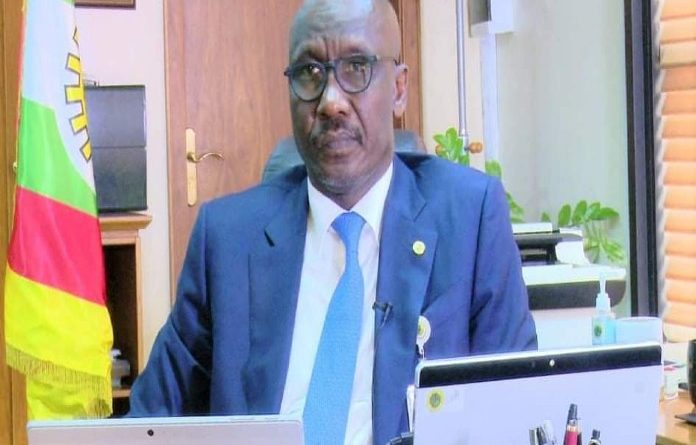NNPC BECOMES EITI PARTNER COMPANY Says New Status to Deepen Commitment to Accountability & Transparency
Oru Leonard
The Nigerian National Petroleum Corporation (NNPC),
has become an Extractive Industries Transparency Initiative (EITI) partner company, joining a group of over 65 extractives companies, state-owned enterprises (SOEs), commodity traders, financial institutions and industry partners who commit to observing the EITI’s supporting company expectations.
According to a release signed by Dr. Kennie Obateru, Group General Manager Group Public Affairs Division, the new status would require that NNPC:
• Publicly declare support for the EITI Principles and, by promoting transparency throughout the extractive industries, help public debate and provide opportunities for sustainable development.
• Publicly disclose taxes and payments.
• Ensure comprehensive disclosure of taxes and payments made to all EITI implementing countries.
• Publicly disclose beneficial owners and take steps to identify the beneficial owners of direct business partners, including Joint Ventures and contractors.
• Engage in rigorous procurement processes, including due diligence in respect to partners and vendors.
• Deliver natural resources in a manner that benefits societies and communities.
• Ensure that company processes are appropriate to deliver the data required for high standards of accountability.
EITI Board Chair, Rt Hon. Helen Clark, welcomed the company’s commitment to the EITI: “NNPC plays a vital role in Nigeria’s economy. Joining the EITI as a supporting company is a welcome step in the NNPC’s journey towards achieving greater transparency and to help ensure that Nigeria’s citizens benefit from their natural resource wealth.”
Zainab Ahmed, Nigeria’s Minister of Finance, Budget and National Planning and former EITI Board member, also stressed the importance of ensuring that natural resource wealth contributes to sustainable development, saying that: “Increased transparency of Nigeria’s national oil company revenues is contributing to improvements in our country’s domestic resource mobilisation efforts.”
Established in 1977, NNPC has grown to become the largest asset holder across Nigeria’s oil and gas industry value chain. Traditionally an oil and gas entity, it is transitioning towards becoming an integrated energy company with an interest in power generation and transmission.
The state-owned company has recently taken measures to become more transparent. In June 2020, it published audited account for 20 of its subsidiaries. NNPC also publishes its financial and operations report every month on its website, national dailies and online media to keep the public informed about its activities as part of efforts to be accountable to Nigerians. It is working with Nigeria EITI (NEITI) on an action plan to routinely disclose information and it currently publishes some of the data required by the 2019 EITI Standard on its website.
These disclosures demonstrate NNPC’s commitment to its journey to become a more transparent national oil company. Adherence to the EITI supporting company expectations will give further impetus to NNPC’s corporate vision of greater transparency and accountability. Three areas in which there is scope for advancing transparency are revenues and payments to government, contracts governing petroleum exploration and production and consolidated group-level financial statements.
Mele Kyari, Group Managing Director at NNPC, affirmed his company’s commitment to the EITI: “Becoming an EITI supporting company aligns with NNPC’s corporate vision and principles of transparency, accountability and performance excellence. Our partnership with NEITI and EITI strengthens our commitment towards commodity trading transparency, contract transparency and systematic disclosure of revenues and payments. We are on a journey towards greater transparency and look forward to deepening our collaboration with the EITI to further this work.”
NEITI Executive Secretary, Waziri Adio, commended NNPC’s move to support the EITI: “NNPC joining the EITI as a supporting company is a major inflection point in the quest for transparency – for the company, for Nigeria’s oil and gas sector, and for the country as a whole. This is so given how critical NNPC is to the sector and to the country. NEITI welcomes this bold commitment. We will continue to work and walk with NNPC to translate its espoused commitments to transparency and accountability into concrete and sustained actions and results.”
Becoming an EITI supporting company can help state-owned companies make progress on the journey to transparency. A recent example is Qatar Petroleum, which has been an EITI supporting company since October 2019 and has now published its annual and sustainability plans for the first time.
Transparency Initiative (EITI) is the global standard to promote the open and accountable management of oil, gas and mineral resources.
Guided by the belief that a country’s natural resources belong to its citizens, the EITI has established a global standard to promote the open and accountable management of oil, gas and mineral resources. The EITI Standard requires the disclosure of information along the extractive industry value chain from the point of extraction, to how revenues make their way through the government, and how they benefit the public. By doing so, the EITI seeks to strengthen public and corporate governance, promote understanding of natural resource management, and provide the data to inform reforms for greater transparency and accountability in the extractives sector. In each of the 54 implementing countries, the EITI is supported by a coalition of government, companies, and civil society.
By becoming a member of the EITI, 54 countries have committed to disclose information along the extractive industry value chain – from how extraction rights are awarded, to how revenues make their way through the government and how they benefit the public. Through participation in the EITI, countries agree to a common set of rules governing what has to be disclosed and when – the EITI Standard.




